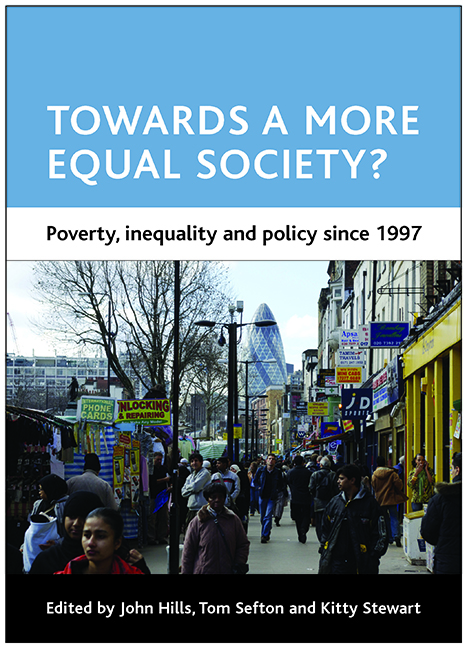thirteen - Poverty, inequality and child well‑being in international context: still bottom of the pack?
Published online by Cambridge University Press: 22 January 2022
Summary
Background
In 1997, the UK compared badly with other Organisation for Economic Co‑operation and Development (OECD) countries on poverty and inequality indicators. Indeed, the country's relative position on child poverty in particular formed part of the impetus for taking action to improve living standards for children. The strategy was wide-ranging, as has been detailed earlier in this book – it included increased funding for childcare and early years policies; policies to promote parental employment; a National Minimum Wage (NMW) and additional support for low earners through the tax credit system; more generous out-of-work benefits for families with younger children; and investment in compulsory education.
Despite these efforts, in 2007 the United Nations Children's Fund (UNICEF) published a report that placed the UK bottom of a child well-being league (UNICEF, 2007). Indicators were persistently poor across the six domains of well-being examined in the report, with the UK ranking bottom or near bottom on material well-being, education, family and peer relationships, risk-taking behaviour and subjective well-being; and middle-ranking on health and safety. The report was greeted as a blow to the New Labour government after a decade of investment in children's welfare (see, for example, The Guardian, 14 February 2007). In reality, however, much of the data represented Labour's starting point more fairly than its achievements: 18 out of 40 indicators came from a 2001-02 survey of 11- to 15-year-olds (Currie et al, 2004).
Given the impact and prominence of the UNICEF study, this chapter aims to provide a more up-to-date assessment of the comparative standing of UK children, and one that more accurately reflects changes in policy since New Labour came to power. It covers in some part all of the UNICEF areas except (for space reasons) infant health and child mortality, where the UK's performance stood out less at the outset. At the same time, it broadens the picture in two ways: it includes measures of overall inequality and poverty for working-age adults and pensioners, and it discusses some of the factors behind the lead indicators. The first half of the chapter is dedicated to the material well-being domain. The second half examines relative progress in education, risks and behaviours (including health behaviour), peer relationships and subjective well-being.
- Type
- Chapter
- Information
- Towards a More Equal Society?Poverty, Inequality and Policy since 1997, pp. 267 - 290Publisher: Bristol University PressPrint publication year: 2009



